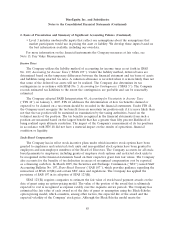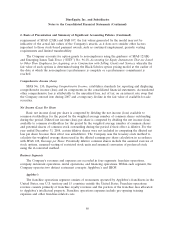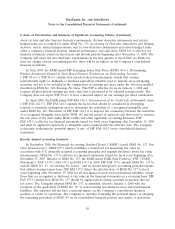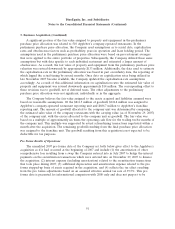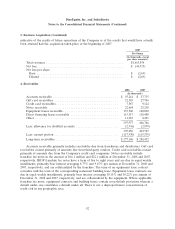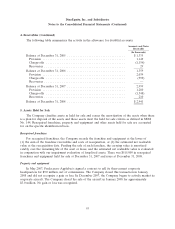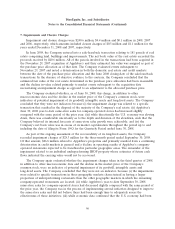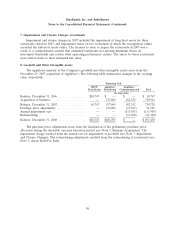IHOP 2008 Annual Report Download - page 102
Download and view the complete annual report
Please find page 102 of the 2008 IHOP annual report below. You can navigate through the pages in the report by either clicking on the pages listed below, or by using the keyword search tool below to find specific information within the annual report.DineEquity, Inc. and Subsidiaries
Notes to the Consolidated Financial Statements (Continued)
2. Basis of Presentation and Summary of Significant Accounting Policies (Continued)
about (a) how and why they use derivative instruments, (b) how derivative instruments and related
hedged items are accounted for under SFAS No. 133, Accounting for Derivative Instruments and Hedging
Activities, and its related interpretations, and (c) how derivative instruments and related hedged items
affect a company’s financial position, financial performance, and cash flows. SFAS 161 is effective for
financial statements issued for fiscal years and interim periods beginning after November 15, 2008. The
Company will adopt the new disclosure requirements in the first quarter of fiscal 2009. As SFAS 161
does not change current accounting practice, there will be no impact on the Company’s consolidated
financial statements.
In June 2008, the FASB issued FSP Emerging Issues Task Force (EITF) 03-6-1, Determining
Whether Instruments Granted in Share-Based Payment Transactions are Participating Securities
(‘‘FSP 03-6-1’’). FSP 03-6-1 clarifies that unvested share-based payment awards that contain
nonforfeitable rights to dividends or dividend equivalents (whether paid or unpaid) are participating
securities and are to be included in the computation of earnings per share under the two-class method
described in SFAS No. 128, Earnings Per Share. This FSP is effective for us on January 1, 2009 and
requires all prior-period earnings per share data that is presented to be adjusted retrospectively. The
Company does not expect FSP 03-6-1 to have a material impact on our earnings per share calculations.
In April 2008, the FASB issued FSP FAS 142-3, Determination of the Useful Life of Intangible Assets
(‘‘FSP FAS 142-3’’). FSP FAS 142-3 amends the factors that should be considered in developing
renewal or extension assumptions used to determine the useful life of a recognized intangible asset
under SFAS No. 142. The intent of FSP FAS 142-3 is to improve the consistency between the useful life
of a recognized intangible asset under SFAS 142 and the period of expected cash flows used to measure
the fair value of the asset under SFAS 141(R) and other applicable accounting literature. FSP
FAS 142-3 is effective for financial statements issued for fiscal years beginning after December 15, 2008
and must be applied prospectively to intangible assets acquired after the effective date. The Company
is currently evaluating the potential impact, if any, of FSP FAS 142-3 on its consolidated financial
statements.
Recently Adopted Accounting Standards
In September 2006, the Financial Accounting Standard Board (‘‘FASB’’) issued SFAS No. 157, Fair
Value Measurements (‘‘SFAS 157’’) which establishes a framework for measuring fair value in
accordance with U.S. generally accepted accounting principles and expands disclosure about fair value
measurements. SFAS No. 157 is effective for financial statements issued for fiscal years beginning after
November 15, 2007. Relative to SFAS No. 157, the FASB issued FASB Staff Position (‘‘FSP’’) FASB
Statements (‘‘FAS’’) 157-1, FAS 157-2 and FAS 157-3 in 2008. FSP FAS 157-1 amends SFAS No. 157 to
exclude SFAS No. 13, ‘‘Accounting for Leases,’’ and its related interpretive accounting pronouncements
that address leasing transactions. FSP FAS 157-2 delays the effective date of SFAS No. 157 to fiscal
years beginning after November 15, 2008 for all non-financial assets and non-financial liabilities, except
those that are recognized or disclosed at fair value in the financial statements on a recurring basis. FSP
FAS 157-3 clarifies how SFAS No. 157 should be applied when valuing securities in markets that are
not active. The Company adopted SFAS No. 157, as amended, effective January 1, 2008 with the
exception of the application of SFAS No. 157 to non-recurring non-financial assets and non-financial
liabilities. The adoption did not have a material impact on the Company’s consolidated financial
position or results of operations. The Company is currently evaluating the potential impact of adopting
the remaining provisions of SFAS 157 on its consolidated financial position and results of operations.
88









